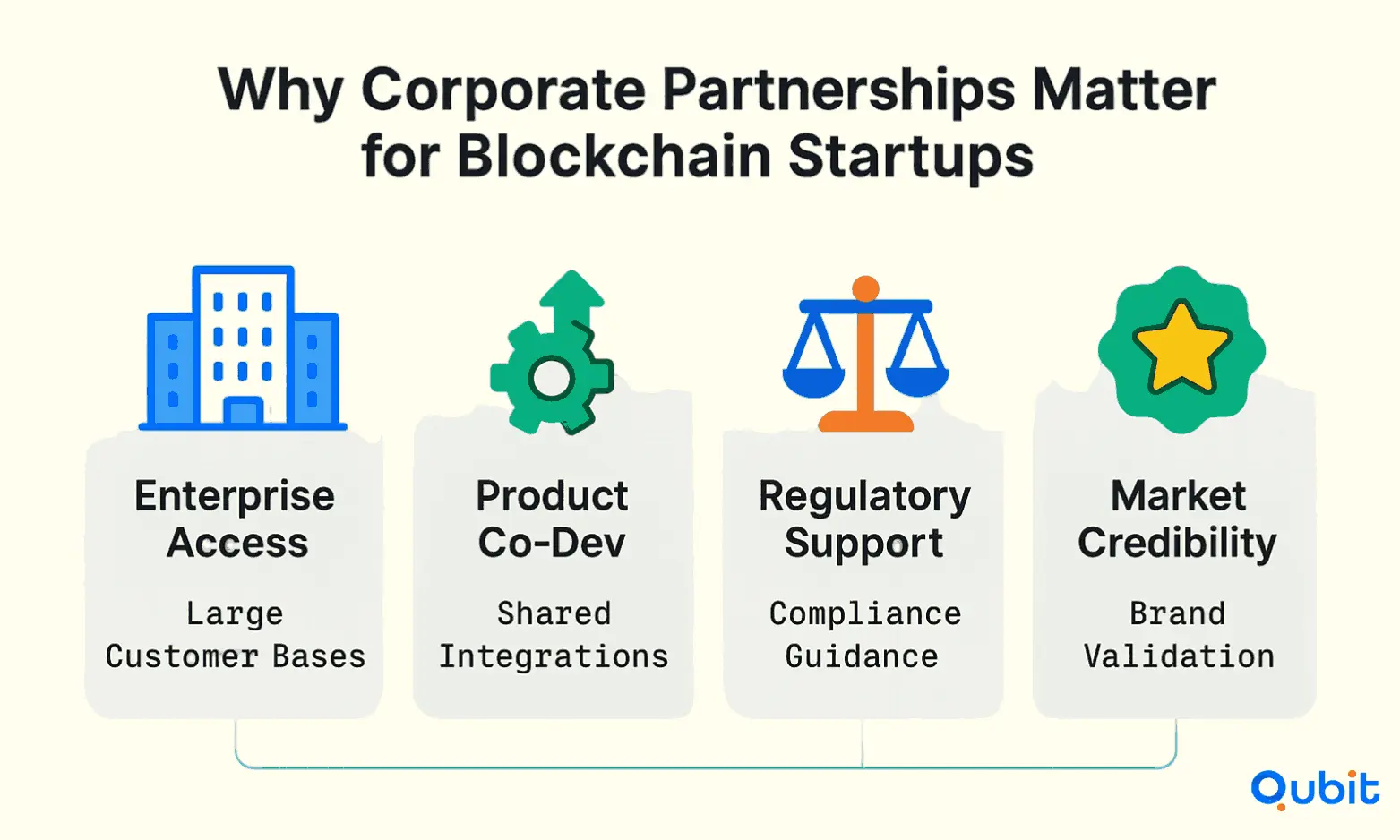Securing capital for a blockchain startup in 2025 is no longer just about finding the right crypto VCs or launching a token sale. Corporate partnerships and traditional finance (TradFi) investors are now among the most powerful growth levers for founders seeking scale, credibility, and long-term impact. The convergence of blockchain innovation with established financial institutions and Fortune 500 companies is not only accelerating adoption but also reshaping the global fundraising landscape. As a founder, you should understand how to attract, negotiate, and maximize these relationships to unlock new markets, resources, and investor confidence.
This guide dives deep into actionable strategies for leveraging corporate alliances and TradFi capital, with practical examples.
The New Era of Blockchain Fundraising
The blockchain fundraising landscape has evolved dramatically. In 2025, over $2 billion in new capital is expected to flow into crypto startups from both corporate giants and established TradFi players. Major corporations like IBM, Robinhood, and Lemonade are not just experimenting with blockchain, they’re actively investing, partnering, and acquiring innovative startups. At the same time, leading financial institutions such as Goldman Sachs, Andreessen Horowitz, and Pantera Capital are making bold bets on Web3 infrastructure, DeFi, and digital assets.
For founders, this means new opportunities, and new expectations. Corporate and TradFi partners bring more than money: they offer credibility, regulatory guidance, enterprise distribution, and access to global markets. But they also demand operational discipline, compliance, and a clear path to value creation.
Why Corporate Partnerships Matter for Blockchain Startups

Beyond Capital, Strategic Value Creation
Partnering with established corporations can transform your startup’s trajectory. These alliances offer:
- Access to enterprise customers and large user bases
- Co-development of new products and integrations
- Regulatory and compliance support
- Brand credibility and market validation
For example, Chainalysis has partnered with banks and government agencies to provide compliance and analytics software, making blockchain safer and more accessible to mainstream institutions. Lemonade, an insurtech, leverages both AI and blockchain in partnership with insurers to streamline claims and payouts
Accelerating Adoption and Distribution
Corporate partners can open doors to markets that would otherwise take years to penetrate. Coinme’s partnership with Coinstar enabled a nationwide network of Bitcoin kiosks, making crypto accessible to millions. Mythical Games collaborates with major gaming studios to bring blockchain-powered digital assets to mainstream players.
From whitepaper notes to a clear, credible plan. The step-by-step blockchain business plan guide helps you align problem → solution → roadmap and cut the fluff.
TradFi Investors: Why They’re Betting Big on Blockchain
Institutional Appetite for Digital Assets
Traditional finance is no longer on the sidelines. In 2025, institutional venture capital firms, hedge funds, and even pension funds are allocating significant capital to blockchain startups. Firms like Digital Currency Group and Blockchain Capital have invested in over 100 projects, including Coinbase, Kraken, and AAVE, driving innovation and adoption across the sector.
What TradFi Brings to the Table
- Deep pools of capital for late-stage scaling
- Expertise in risk management, compliance, and governance
- Connections to regulators, banks, and global investors
- Long-term investment horizons and stability
Andreessen Horowitz and Greylock, for example, are backing infrastructure projects that promise to power the next generation of finance. Goldman Sachs is investing in digital asset management and blockchain-based financial products.
How to Attract Corporate and TradFi Investment
1. Align Your Vision with Their Strategic Goals
Corporates and TradFi investors are looking for startups that solve real problems in their core markets. Study their public statements, recent investments, and partnership announcements. Tailor your pitch to show how your technology can drive efficiency, security, or new revenue streams for their business. For detailed tactics, see blockchain fundraising strategies.
2. Build for Compliance and Enterprise-Grade Security
Big players won’t risk their reputation on startups with weak compliance or security. Invest in audits, robust KYC/AML, and transparent reporting. Chainalysis is a prime example, having built a business on trust and regulatory alignment.
3. Leverage Ecosystem Grants and Corporate Accelerators
Many Layer-1 protocols and tech giants offer grants, accelerators, and co-development programs. These can provide both non-dilutive capital and direct access to corporate partners. For instance, Algorand’s ecosystem funds and Republic’s real estate platform connect startups to both capital and strategic guidance. Learn more in blockchain grants ecosystem funds.
4. Demonstrate Traction and Real-World Use Cases
Corporates and TradFi investors want proof, not just potential. Showcase live integrations, enterprise pilots, or growing user bases. Highlight how partnerships have already accelerated your growth.
If you're looking for expert guidance, our team at Qubit Capital is here to assist. Explore our fundraising assistance services to take your campaign to the next level.
Structuring and Negotiating Corporate Partnerships
Types of Partnerships
- Joint Ventures: Co-developing products or infrastructure with shared IP.
- Strategic Investments: Minority stakes with board representation or observer rights.
- Go-to-Market Alliances: Bundling your solution with a corporate’s existing products.
- Acquisition Pathways: Early-stage partnerships that may lead to M&A.
Key Terms and Pitfalls
- Exclusivity: Avoid giving away exclusive rights unless compensated for lost opportunities.
- IP Ownership: Clearly define who owns what, especially for co-developed technology.
- Milestone-Based Funding: Link capital infusions to product or market milestones.
- Governance: Balance oversight with autonomy—board seats can be valuable, but too much control can stifle innovation.
TradFi Due Diligence: What to Expect
Institutional Investor Checklists
- Security audits and compliance certifications
- Financial controls and transparent reporting
- Clear cap table and governance structure
- Proof of reserves and treasury management
Building Trust with TradFi
- Engage early and often: Build relationships before you need capital.
- Be transparent: Share both wins and setbacks.
- Showcase resilience: Demonstrate how you’ve managed risk and adapted to market changes.
Case Studies: Startups Winning with Corporate and TradFi Backing
Chainalysis: Building a Compliance Powerhouse
Chainalysis pioneered blockchain forensic technology, partnering with JPMorgan, Barclays, and the FBI to combat crypto crime. Their corporate strategy included:
- Strategic Alliances: Signed enterprise contracts with 7 central banks and 100+ law enforcement agencies.
- Funding Milestones: Raised $535M from TradFi giants GIC and Bank of New York Mellon, plus crypto VCs like Accel.
- Value Creation: Reduced investigation time for illicit transactions by 90%, becoming the de facto compliance layer for institutions entering crypto.
Why it worked: Chainalysis aligned with corporate partners' regulatory pain points, transforming compliance from a cost center into a revenue stream.
Coinme: Bridging Physical and Digital Economies
Coinme partnered with Coinstar (owned by Apollo Global) to deploy 22,000+ Bitcoin ATMs across grocery stores like Walmart. Their playbook:
- Distribution Leverage: Used Coinstar’s existing 500,000+ kiosk network for instant scale.
- TradFi Integration: Secured $40M from Mastercard and BlackRock to build fiat-crypto rails.
- User Growth: Onboarded 3M+ first-time crypto buyers by simplifying cash-to-Bitcoin conversions.
Key Insight: Coinme solved a physical distribution gap for TradFi investors seeking crypto exposure.
Republic: Democratizing Real Estate Investment
Republic merged blockchain with real estate through:
- Corporate Synergies: Partnered with Binance and Avalanche to tokenize $700M in property assets.
- TradFi Backing: Raised $150M from Galaxy Digital and Morgan Stanley.
- Regulatory Innovation: Pioneered SEC-qualified Reg CF offerings, enabling fractional ownership for 500,000+ users.
Outcome: Turned illiquid real estate into tradable digital assets, attracting both crypto-native users and institutional capital.
Integrating Community-Driven and Institutional Fundraising
The most successful blockchain startups blend community-driven fundraising (like IDOs and launchpads) with corporate and TradFi capital. This hybrid model maximizes reach, credibility, and resilience. For a practical guide to launchpads and IDOs, see blockchain launchpad IDO guide.
Overcoming Challenges: What Founders Need to Know
Navigating Slow Decision Cycles
Corporates and TradFi investors often move slower than crypto-native funds. Anticipate longer due diligence and legal reviews. Start conversations early and maintain momentum with regular updates.
Managing Competing Priorities
Large partners may have shifting priorities or internal politics. Secure clear commitments, defined milestones, and escalation paths in your agreements.
Balancing Decentralization and Control
TradFi and corporate partners may seek governance rights or veto power. Structure deals to protect your startup’s ability to innovate and adapt.
The Future of Blockchain Fundraising: Trends to Watch
- Rising M&A activity as corporates seek to acquire blockchain capabilities.
- Growth of hybrid funds blending TradFi and Web3 expertise.
- Expansion of ecosystem grant programs from Layer-1s and corporates.
- Increased regulatory scrutiny driving demand for compliance-first startups.
Conclusion
The era of siloed crypto fundraising is over. In 2025, the most successful blockchain startups are those that harness the strengths of both corporate partnerships and TradFi investors. These alliances bring not just capital, but also credibility, compliance, and access to global markets. By building for enterprise needs, demonstrating real traction, and structuring smart, flexible deals, you can unlock the next wave of growth and innovation for your startup.
If you’re looking to blend corporate partnerships with TradFi capital, at Qubit we understand enterprise needs, diligence asks, and deal choreography. Move forward with our blockchain fundraising assistance. Book a strategy call this week.
Key Takeaways
- Corporate and TradFi investors are pouring billions into blockchain, seeking innovation, compliance, and real-world impact.
- Partnerships offer more than capital—think distribution, credibility, and regulatory support.
- Success requires alignment, enterprise-grade security, and clear value creation.
- Hybrid fundraising models, blending community and institutional capital, are setting the pace in 2025.
Frequently asked Questions
How do I identify the right corporate partners for my blockchain startup?
Look for companies aligned with your target market and technology. Research their recent investments and partnership models for best fit.






